译林牛津版高中英语模块八Unit1 The written world Grammar and usage课件(共26张)
文档属性
| 名称 | 译林牛津版高中英语模块八Unit1 The written world Grammar and usage课件(共26张) |

|
|
| 格式 | zip | ||
| 文件大小 | 89.2KB | ||
| 资源类型 | 教案 | ||
| 版本资源 | 牛津译林版 | ||
| 科目 | 英语 | ||
| 更新时间 | 2019-06-18 00:00:00 | ||
图片预览


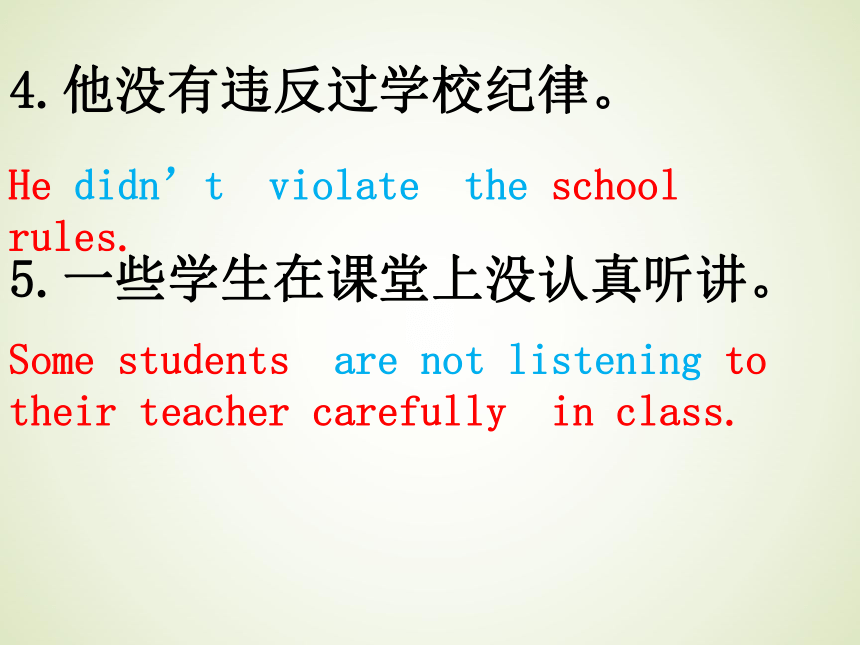
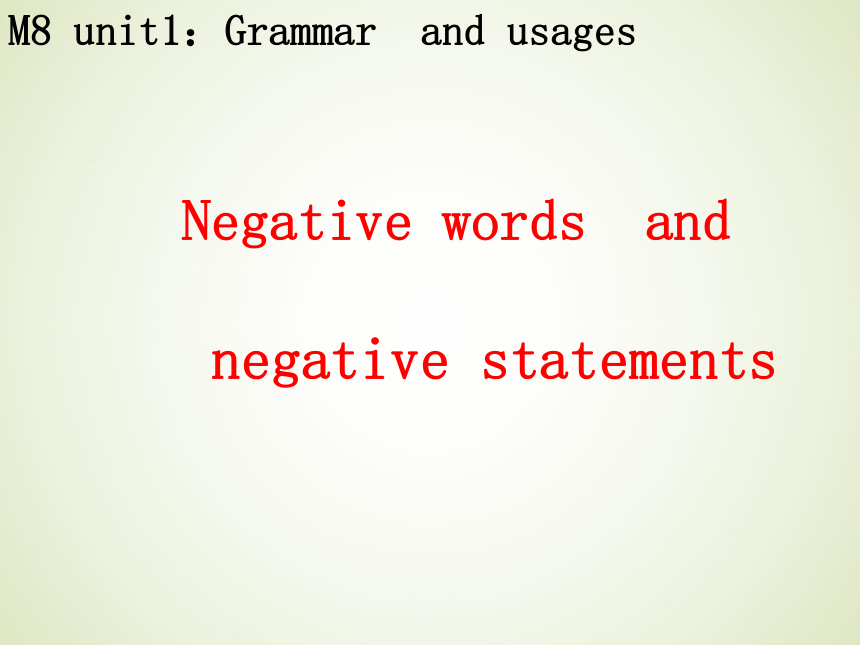
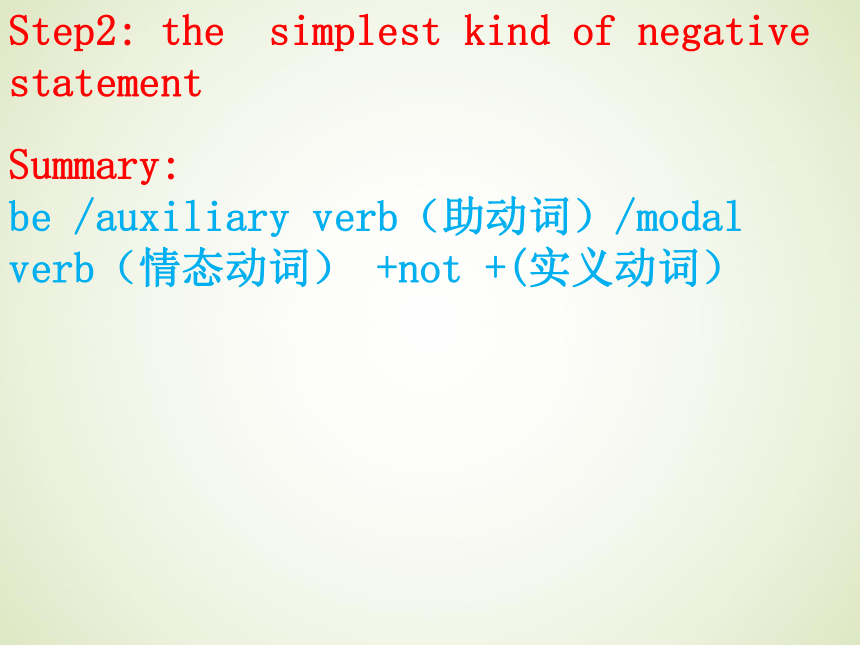
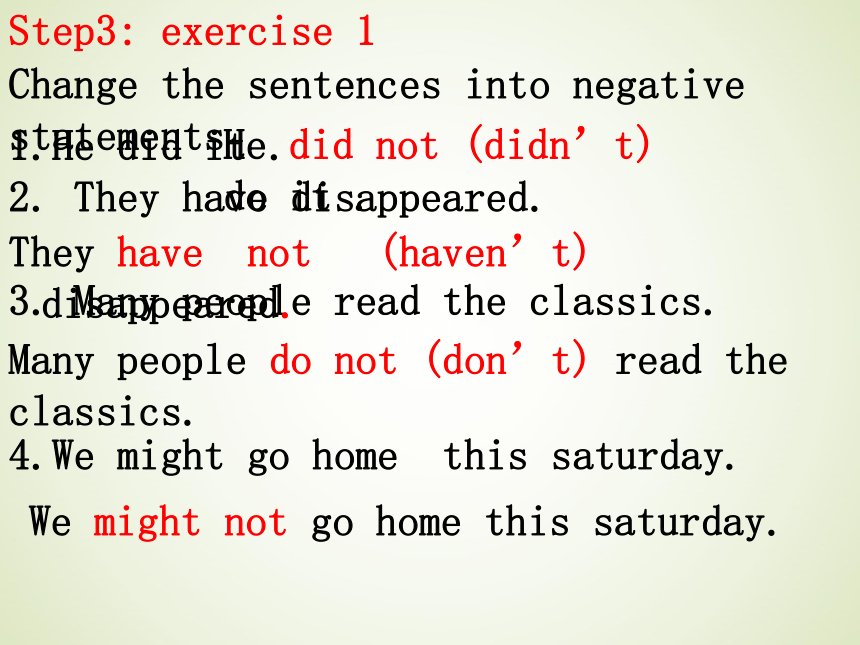
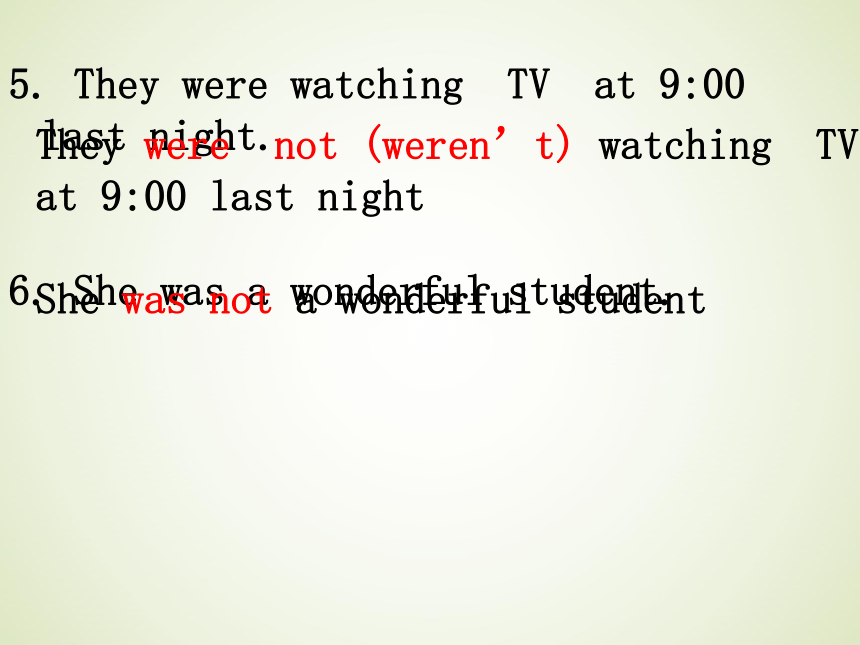

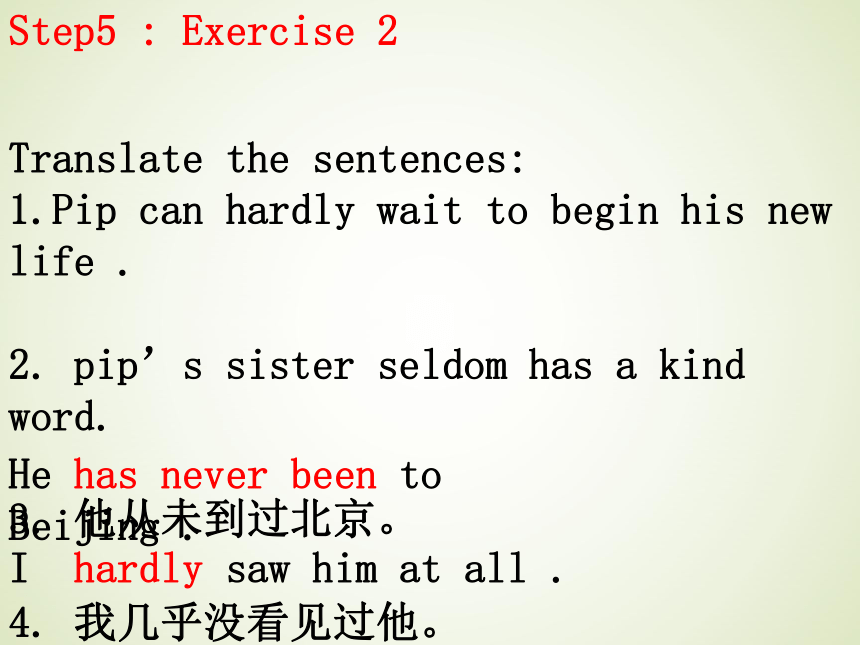
文档简介
课件26张PPT。Step1 :lead –in
Check your homework
我不是326班的学生。
2.她不能去那里。
3.你最好不要在课堂上说话。
I am not a student of Class 326.She can’t go there.You had better not talk in class.4.他没有违反过学校纪律。
5.一些学生在课堂上没认真听讲。He didn’t violate the school rules.Some students are not listening to their teacher carefully in class.M8 unit1:Grammar and usages Negative words and
negative statementsStep2: the simplest kind of negative statement Summary:
be /auxiliary verb(助动词)/modal verb(情态动词) +not +(实义动词)Step3: exercise 1 Change the sentences into negative statements He did it .
2. They have disappeared.
3. Many people read the classics.
4.We might go home this saturday.
He did not (didn’t) do it .They have not (haven’t) disappeared.Many people do not (don’t) read the classics.We might not go home this saturday.5. They were watching TV at 9:00 last night.
6. She was a wonderful student.They were not (weren’t) watching TV at 9:00 last night
She was not a wonderful studentStep 4: common negative adverbs除了not外, never(从不);
seldom(很少;不常); rarely(很少);
hardly(几乎不); scarcely (几乎不); Step5 : Exercise 2 Translate the sentences:
1.Pip can hardly wait to begin his new life .
2. pip’s sister seldom has a kind word.
3. 他从未到过北京。
4. 我几乎没看见过他。
He has never been to Beijing .I hardly saw him at all .Summary:
be /auxiliary verb(助动词)/modal verb +never(从不); seldom(很少;不常); rarely(很少); hardly(几乎不); scarcely (几乎不); +(实义动词)Step 6: common negative adjectives Look at the examples :
I have got no news from him .
2. There is little time left.
common negative adjectives : no(没有) ; little(几乎没有) ;few(几乎没有)
+noun(名词)
Little+不可数名词; few+可数名词 Step7 : Exercise 3 单句改错:
We have not money.
2. Little people like snakes.
3.I have few water in my bottle.
not noLittle Few fewlittleStep 8: common negative pronouns Look at the examples :
Neither of us has foreseen the future.
2. Unfortunately ,none of these reference
books was useful.
common negative pronouns :
指人(没有人):nobody ; no one
指物(没有东西):nothing
指人或指物:neither(两者都不); none(三者或三者以上都不);
neither /none (+ of)Step9: Exercise 4 Fill in the blanks:
没有人想去那里。
_____________wants to go there.
2.没有学生回答这个问题。
_____of the students answered the question.
3. 没有牛奶能够被使用。
_____of the milk can be used.
Nobody/No one None None Fill in the blanks:
3. 在桌子上没有任何东西。
There is _______on the table.
4.这两本书我都不喜欢。
I like _______ the books.
5. 我们两个人都不喜欢早起。
_______ of us like getting up early.
neither Neither nothing这些否定代词用在句中表全部否定(complete negation)Step10: partial negation When words like all, both, everyone , everything are used in negative sentences ,they form partial negation.
For example:
I didn’t take everything with me. ( I only took some of the things with me )Step 11: Exercise 5Translate the sentences into Chinese:
1. All that you find on the Internet is not useful .
2. Not all bamboos grow tall.
3. I don’t want both the books.
4. Not everyone likes the coat.
5. Not everything goes well.
Step 12: other forms Some common negative expressions:
far from(完全不;决非); would rather……than(宁愿…… 而不愿); free from(免受);
1.Classics are far from disappearing .
2.Joe would rather die than see any harm come to pip.
3. The news sets him free from worries about his family.Step 13: not+un-/dis-/in-/When it is used before a word with a negative prefix ,the meaning of the sentence becomes positive. It is not uncommon to find him whistling while walking .= It is quite common to find him whistling while walking.John is not unable to do it.
It is not impossible for us to pass the coming Academic Level Exam. Step 14:固定搭配can’t…….too; can’t ……enough
(再怎么样,也不为过);A student can’t read too many books.( The more books a student reads, the better.)
I can’t thank you enough.( I am very grateful to you .)横过马路时你再怎么小心也不为过。You can not be too careful when crossing a road.
You can not be careful enough when you cross a road. Step 15 : summary 英语中否定词有三类:1.negative adverbs: not, never(从不);
seldom(很少;不常); rarely(很少);
hardly(几乎不); scarcely (几乎不)2.negative adjectives :no(没有) ; little(几乎
没有) ;few(几乎没有)3.negative pronouns :
指人(没有人):nobody ; no one
指物(没有东西):nothing
指人或指物:neither(两者都不);
none(三者或三者以上都不) 一个句子中含有否定副词或否定形容词或否
定代词,这个句子就是否定句。一个句子中含有far from; would
rather……than; free from等,这个句子不是否定句。Step 16: practice
Finish part C1 at page 100
Homework: Part C2 at page 100
Check your homework
我不是326班的学生。
2.她不能去那里。
3.你最好不要在课堂上说话。
I am not a student of Class 326.She can’t go there.You had better not talk in class.4.他没有违反过学校纪律。
5.一些学生在课堂上没认真听讲。He didn’t violate the school rules.Some students are not listening to their teacher carefully in class.M8 unit1:Grammar and usages Negative words and
negative statementsStep2: the simplest kind of negative statement Summary:
be /auxiliary verb(助动词)/modal verb(情态动词) +not +(实义动词)Step3: exercise 1 Change the sentences into negative statements He did it .
2. They have disappeared.
3. Many people read the classics.
4.We might go home this saturday.
He did not (didn’t) do it .They have not (haven’t) disappeared.Many people do not (don’t) read the classics.We might not go home this saturday.5. They were watching TV at 9:00 last night.
6. She was a wonderful student.They were not (weren’t) watching TV at 9:00 last night
She was not a wonderful studentStep 4: common negative adverbs除了not外, never(从不);
seldom(很少;不常); rarely(很少);
hardly(几乎不); scarcely (几乎不); Step5 : Exercise 2 Translate the sentences:
1.Pip can hardly wait to begin his new life .
2. pip’s sister seldom has a kind word.
3. 他从未到过北京。
4. 我几乎没看见过他。
He has never been to Beijing .I hardly saw him at all .Summary:
be /auxiliary verb(助动词)/modal verb +never(从不); seldom(很少;不常); rarely(很少); hardly(几乎不); scarcely (几乎不); +(实义动词)Step 6: common negative adjectives Look at the examples :
I have got no news from him .
2. There is little time left.
common negative adjectives : no(没有) ; little(几乎没有) ;few(几乎没有)
+noun(名词)
Little+不可数名词; few+可数名词 Step7 : Exercise 3 单句改错:
We have not money.
2. Little people like snakes.
3.I have few water in my bottle.
not noLittle Few fewlittleStep 8: common negative pronouns Look at the examples :
Neither of us has foreseen the future.
2. Unfortunately ,none of these reference
books was useful.
common negative pronouns :
指人(没有人):nobody ; no one
指物(没有东西):nothing
指人或指物:neither(两者都不); none(三者或三者以上都不);
neither /none (+ of)Step9: Exercise 4 Fill in the blanks:
没有人想去那里。
_____________wants to go there.
2.没有学生回答这个问题。
_____of the students answered the question.
3. 没有牛奶能够被使用。
_____of the milk can be used.
Nobody/No one None None Fill in the blanks:
3. 在桌子上没有任何东西。
There is _______on the table.
4.这两本书我都不喜欢。
I like _______ the books.
5. 我们两个人都不喜欢早起。
_______ of us like getting up early.
neither Neither nothing这些否定代词用在句中表全部否定(complete negation)Step10: partial negation When words like all, both, everyone , everything are used in negative sentences ,they form partial negation.
For example:
I didn’t take everything with me. ( I only took some of the things with me )Step 11: Exercise 5Translate the sentences into Chinese:
1. All that you find on the Internet is not useful .
2. Not all bamboos grow tall.
3. I don’t want both the books.
4. Not everyone likes the coat.
5. Not everything goes well.
Step 12: other forms Some common negative expressions:
far from(完全不;决非); would rather……than(宁愿…… 而不愿); free from(免受);
1.Classics are far from disappearing .
2.Joe would rather die than see any harm come to pip.
3. The news sets him free from worries about his family.Step 13: not+un-/dis-/in-/When it is used before a word with a negative prefix ,the meaning of the sentence becomes positive. It is not uncommon to find him whistling while walking .= It is quite common to find him whistling while walking.John is not unable to do it.
It is not impossible for us to pass the coming Academic Level Exam. Step 14:固定搭配can’t…….too; can’t ……enough
(再怎么样,也不为过);A student can’t read too many books.( The more books a student reads, the better.)
I can’t thank you enough.( I am very grateful to you .)横过马路时你再怎么小心也不为过。You can not be too careful when crossing a road.
You can not be careful enough when you cross a road. Step 15 : summary 英语中否定词有三类:1.negative adverbs: not, never(从不);
seldom(很少;不常); rarely(很少);
hardly(几乎不); scarcely (几乎不)2.negative adjectives :no(没有) ; little(几乎
没有) ;few(几乎没有)3.negative pronouns :
指人(没有人):nobody ; no one
指物(没有东西):nothing
指人或指物:neither(两者都不);
none(三者或三者以上都不) 一个句子中含有否定副词或否定形容词或否
定代词,这个句子就是否定句。一个句子中含有far from; would
rather……than; free from等,这个句子不是否定句。Step 16: practice
Finish part C1 at page 100
Homework: Part C2 at page 100
